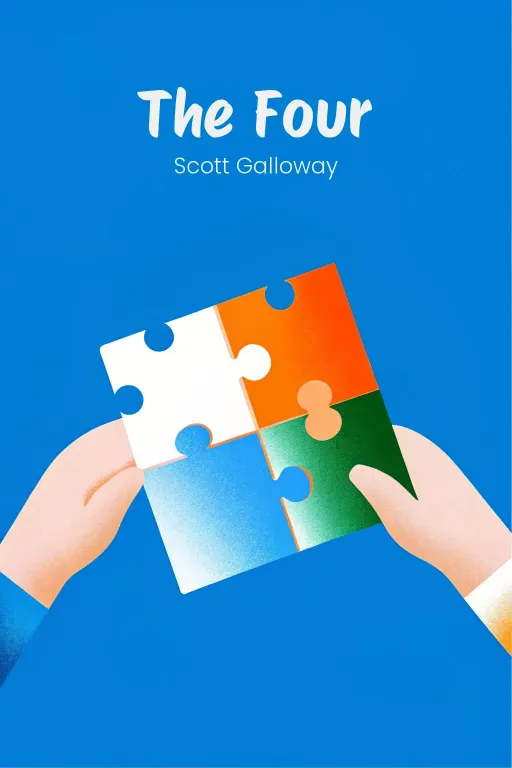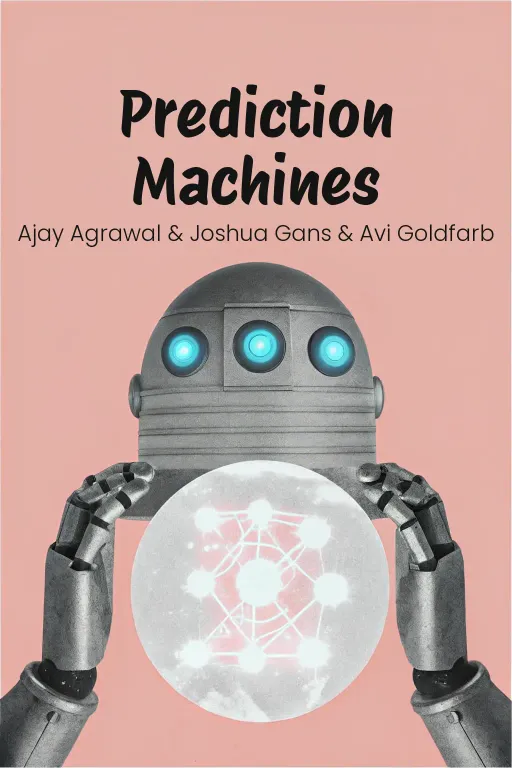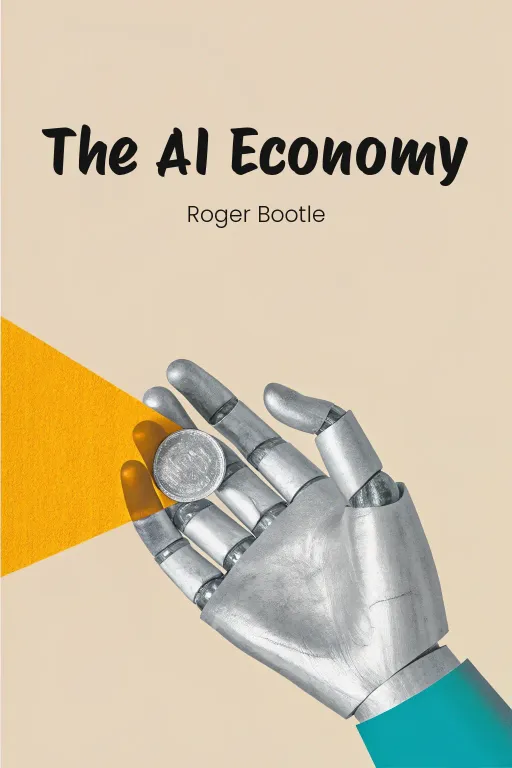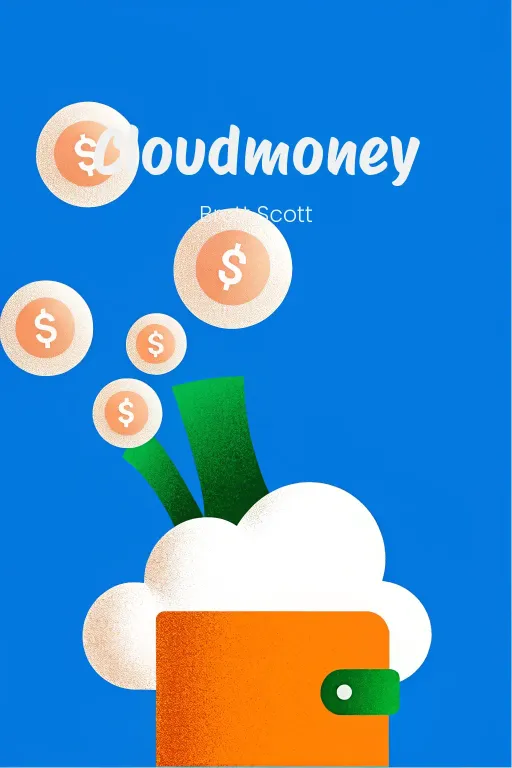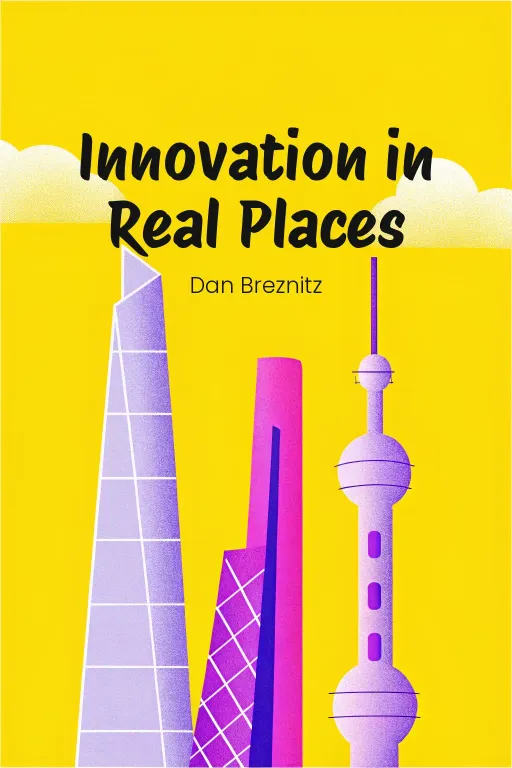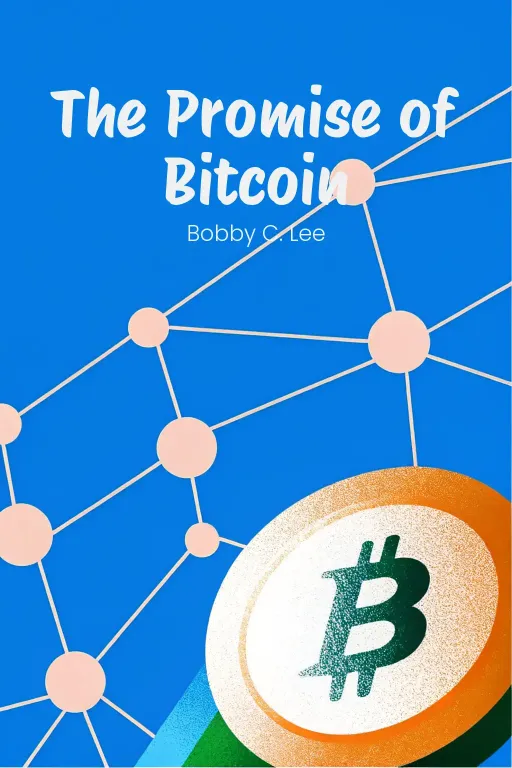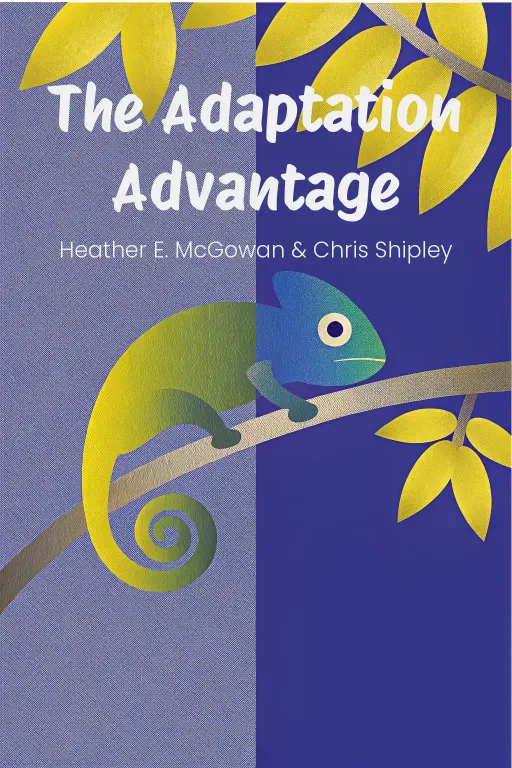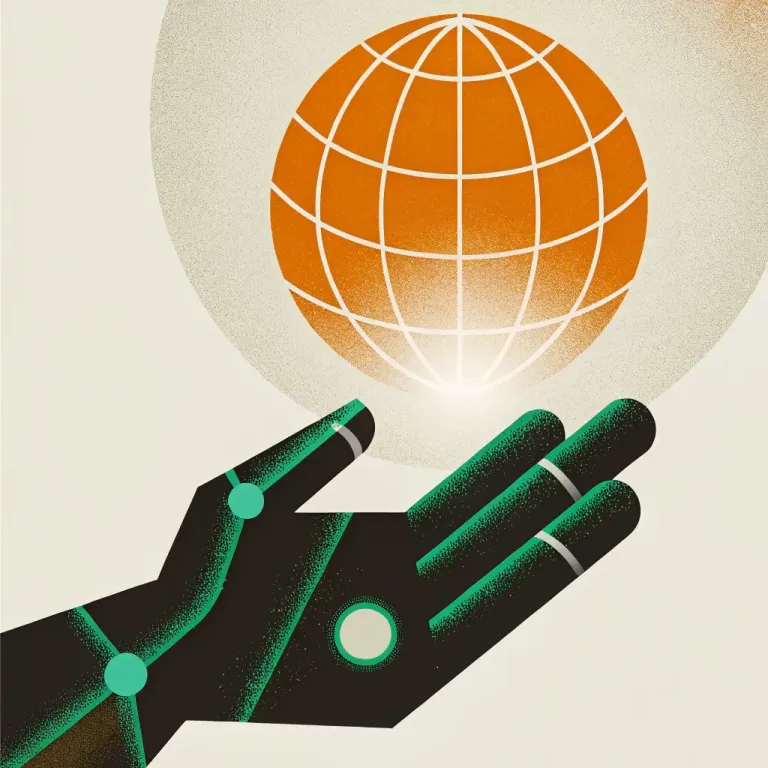
Decoding AI: Jobs, Wealth, and Our Future
Podcast by Wired In with Josh and Drew
Work, Wealth and Welfare in the Robot Age
Introduction
Part 1
Josh: Hey everyone, welcome back! Today we're tackling a potentially revolutionary topic... something that could “really” change how we work, live, and even how we see ourselves as humans. Drew: AI again, right? Because there’s nothing I find more relaxing than thinking about robots taking over the world while I host a podcast. Josh: Not take over, Drew. “Evolve”! We're talking about "The AI Economy: Work, Wealth, and Welfare in the Robot Age" by Roger Bootle. It's a “really” in-depth look at how AI and robotics are reshaping our economy and what that means for all of us. Drew: So, robots stealing our jobs. Anything new there? Josh: Oh, there's way more to it than that. Bootle doesn't just focus on job losses; he explores how AI can be a “real” force for progress, if we're ready for it. He covers a lot of ground, from historical lessons from past tech revolutions to the policies we'll need to prevent massive inequality. Drew: Fantastic. Because the best "progress" involves a 50-year-old learning to code after being replaced by a robot, right? Josh: I get the sarcasm, Drew, but hear me out. Today, we're going to break this down into three parts. First, we'll look at how past tech revolutions– like the steam engine – can help us understand the disruptions AI is bringing. Then, we'll dive into the job creation versus inequality issue in this robot age. And finally, we'll talk about solutions: the policies and ethical guidelines that could make sure AI works for humanity, not against it. Drew: Steam engines to surveillance capitalism, huh? Alright, let’s see if Bootle's optimism can stand up to my line of questioning.
Historical Context of Technological Disruption
Part 2
Josh: So, about those steam engines, let's dive into the historical comparison that Bootle draws between the Industrial Revolution and this AI era. Understanding the past “really” gives us a good base for dealing with the current disruptions. One thing he points out that I find fascinating is the "Engels pause." It's that tricky period during the early Industrial Revolution where all the technological advancements didn’t immediately improve the lives of factory workers. Drew: Exactly, because new machines didn’t magically mean better wages or working conditions, right? The so-called "progress" mostly benefited the factory owners and investors, while the workers were stuck with low pay, long hours, and awful conditions. Sounds pretty familiar, doesn't it? Josh: It does, history definitely seems to be rhyming here. Bootle mentions that even though productivity went way up during that time, real wages didn’t significantly increase until around 1870. So, you had decades of economic growth that mainly benefited a few, while most people struggled with instability and stagnant income. Now, think about AI. The concern is that the tech companies and the wealthy will reap most of the benefits from AI-driven productivity. Drew: And let's not forget Friedrich Engels himself. He wasn't just watching from the sidelines; he was outraged by the inequality. He co-wrote "The Communist Manifesto" with Karl Marx, partly because he saw all this wealth concentrated and the terrible working conditions. So, are we headed for an "AI Engels pause" now? Josh: Possibly. Bootle presents it as a warning, not a certainty. He argues that productivity gains, even if they're enormous, won't automatically benefit everyone unless we have policies in place to prevent wealth from concentrating at the top. He says policymakers need to be proactive. That means things like wealth redistribution, subsidies, or even supporting industries that combine human skills with AI, rather than just replacing workers entirely. Drew: Right, but that assumes policymakers will recognize the problem quickly enough “and” actually do something about it. Look how long it took wages to catch up during the Industrial Revolution. Millions were stuck in poverty, waiting for the economy to "recalibrate." And in the meantime, many had no safety net at all. Josh: That’s exactly why acting now is so important. AI's got a speed advantage. Its disruptions don't take a century; they happen in decades, even just years. The book also ties this into the idea of "creative destruction." Schumpeter coined that term to describe how innovation wipes out older industries while creating new ones. Drew: Ah, yes, the Luddites. Good old machine-breaking as a form of self-care. At least they resisted. Josh: To be fair, you can see why they were frustrated. Skilled textile workers who’d spent their lives mastering their craft were suddenly replaced by machines that were faster and cheaper. It shows how technological progress can feel like a threat to some professions. Drew: Which brings us to today. AI isn't just taking over physical tasks. It's moving into cognitive areas too: data analysis, customer service, even creative jobs. The scope is wider. The disruption is faster. Where do people go when their entire skillset becomes useless? Josh: Well, Bootle argues that historically, these disruptions, while painful in the short term, ultimately benefit society overall. The Industrial Revolution, for example, didn’t just kill off traditional craftsmanship; it also created factory jobs and, later, completely new industries. Drew: Comforting, but those silver linings also came with things like "child labor" and "slum living." Those factory jobs weren't exactly great. Are we saying the future AI workforce will be in a similar transitional situation? Josh: That's why Bootle emphasizes education and reskilling so much. Workers need to move into roles that AI can't easily replace—at least not yet—like advanced technical positions, AI ethics consultants, or even creative storytelling where human emotion is key. It’s a dual solution: personal adaptability and societal safety nets. Drew: Personal adaptability, sure. But what about the average worker in their 50s whose job just got automated out of existence? Telling them to learn machine learning is like giving a drowning person a dictionary instead of a life preserver. Josh: That’s where societal support comes in. Bootle points out that a lot of this boils down to policy: implementing universal basic income, encouraging partnerships between public and private sectors for training, and adjusting labor laws so displaced workers have a chance to get back into the economy. Drew: It feels like a race against time, especially when we haven't even figured out the economic implications yet. What happens when millions of displaced workers can’t participate as consumers anymore? Great Depression, but with AI? Josh: That's a valid concern that Bootle explores. He explains how, during the Great Depression, demand dropped because too many people were unemployed. AI amplifies that risk. If too many people lose their jobs without new options, they stop spending. That feedback loop halts growth. The goal is to avoid that by using AI-generated wealth to stimulate job creation and consumer spending at the same time. Drew: You say "stimulate" like there's a clear plan for it. Who's designing this next "Henry Ford moment" for the AI age? He revolutionized car manufacturing to boost the economy. Are we waiting for some genius entrepreneur to make smart robots “and” make them affordable for the masses, creating new jobs along the way? Josh: Bootle does lean towards that optimism. He suggests there’s always room for innovation to address demand gaps. But it depends on how we manage the wealth and productivity gains that AI creates. Innovation doesn't happen in a vacuum; it needs the right conditions. Drew: Okay, so the book basically has two big historical lessons: discomfort and disruption are inevitable, but fair policies and visionary thinking can lead to progress. History doesn’t repeat, but it sure does rhyme. Josh: Exactly. The Industrial Revolution set the stage for this conversation: technology itself isn’t good or bad, it's about how we use it. And as we face AI’s unique scale and speed, those historical echoes are more relevant than ever.
AI's Dual Impact on Employment and Inequality
Part 3
Josh: So, understanding these historical patterns “really” sets the stage, doesn't it? It helps us see if AI's impact will follow a similar path or completely diverge. And that, of course, brings us to today's main topic: AI's double whammy on employment and inequality. Let's build on this history and look at the immediate economic impacts—the job market and inequality—and how we can proactively avoid repeating the mistakes of the past. Drew: Okay, Josh, so we've set the table. Disruption’s coming, inequality’s likely if we don't address it, and, well, the clock's ticking faster than it did in Engels’ day. So, let’s just dive right in. How do you see this whole job creation versus job elimination playing out with AI? Josh: Sure, well, the tension is pretty clear, I think. AI presents this dual narrative, right? On one hand, it disrupts and eliminates roles that are “really” just routine tasks, repetitive work, easy to automate. But on the other hand, it creates opportunities in areas where creativity, empathy, or complex problem-solving are key—things that AI, for now anyway, struggles to replicate. Drew: Okay, let's hit the job destruction piece first. Retail, for example. I was in one of those Amazon cashier-less stores the other day, you know, where you just walk in, grab your stuff, and leave. You don't even see a cashier... it's like magic. Convenient, sure, but what happens to all the cashiers? Josh: That's exactly the concern that Bootle raises. Cashier positions, particularly in the U.S. alone, make up about 3.5 million jobs. And they're some of the most vulnerable roles to automation. Technologies like Amazon’s "Just Walk Out" system use sensors, computer vision, and machine learning to replace the entire checkout process. Drew: And as mind-blowing as that tech is, we can't ignore the human cost. You know, for a lot of people, those cashier jobs aren’t just some side hustle—they're a lifeline. So, if 3.5 million people are out of work in one sector, where do they go? Josh: That’s where the flip side comes in. Bootle highlights growth in sectors like healthcare. Here, AI is more of an assistant than a replacement. Take diagnostics, for example. AI can spot early signs of disease with this incredible precision, but it's the doctors and nurses who contextualize those findings, explain them to patients, and, of course, address the emotional side of patient care. Plus, we have an aging population, so the need for caregivers is growing, not shrinking. Drew: Right, healthcare grows, but come on, not everyone can just switch from cashier to, say, geriatric nurse. I mean, even if the demand's there, isn't a big part of the problem that transitioning to these resilient sectors requires major reskilling? And, well, that’s often easier said than done. Josh: Absolutely, you're right, it's a fair point. The book “really” stresses that education and retraining are key. Public-private partnerships could step up and offer accessible programs that train workers for roles that AI can augment, not replace. And some sectors, like creative industries, may offer a smoother transition for certain skill sets. Think about how AI tools support, rather than replace, graphic designers, writers, or music composers. AI can generate ideas or streamline workflows, but human touch still does drive originality. Drew: Okay, I'll give you that. But let's flip to inequality, because even if we're optimistic about job creation, the "winner-takes-all" economy feels like a huge elephant in the room. I mean, tech giants dominating; regions with this uneven access to resources… it's already happening! Doesn’t AI just pour gasoline on that fire? Josh: It could, absolutely, unless we are proactive. Bootle paints a “really” stark picture: regions that relied heavily on manufacturing jobs are already struggling to pivot. Automation makes that even worse, displacing workers in those same areas, while growth concentrates in urban centers or tech hubs. So, it's a geographic divide as well as a socioeconomic one. And that feedback loop—where regions with fewer resources fall further behind—is a “real” issue. Drew: It’s a problem, and it's personal for the people living through it. Imagine spending decades working in a manufacturing job, only to see factories replaced by machines and income prospects dwindling as a result. The ripple effect doesn't just stop at unemployment stats, it reshapes entire communities. Josh: Exactly. And at the same time, the companies driving these innovations often concentrate wealth and opportunity at the very top. Think about how scalable AI is. Once it's developed, replicating it costs next to nothing. That's fantastic for profitability, but it also means the financial rewards “really” consolidate, you know, with the CEOs, executives, and shareholders of companies of the like of Amazon, Google, or Facebook. Drew: Right– and that consolidation feeds right back into inequality. It's like some algorithm of wealth inequality. You train AI with data from today's concentrated system, and surprise, you get an even more concentrated future. Josh: Wow, that's a vivid way to put it. Bootle suggests solutions hinge on “really” rethinking labor laws, taxation, and wealth distribution. Whether it's through AI-enabled job initiatives in struggling areas, or taxing companies proportionately to the jobs they replace, it's about creating these mechanisms for shared prosperity. Drew: But isn't "shared prosperity" just theoretical without any “real” enforcement? We need policy, yes, but also accountability. Otherwise, are companies voluntarily deciding to redistribute their revenue out of pure goodwill? Josh: Probably not. That's why Bootle emphasizes government intervention in addressing inequality. Policies could include taxes targeting automation adopters, expanded safety nets like universal basic income, and incentives for companies to invest in human-AI collaborative roles. The idea isn’t to hinder innovation—it’s to steer it toward long-term societal benefit. Drew: And here's the big question: who foots the bill for retraining? Private corporations, governments, or the individuals? Because, well, asking low-income workers who've already been displaced to pay for skill upgrades just feels a bit tone-deaf, doesn’t it? Josh: It does, I agree. That's why we need creative, inclusive solutions. Subsidized programs, tuition-free tech apprenticeships: Bootle argues that reshaping the workforce has to spread responsibility across public and private sectors.
Policy and Ethical Responses to AI
Part 4
Josh: So, that brings us to how societies can actually deal with these inequalities through policy and education . Which, naturally, leads us to today’s main topic: policy and ethical responses to AI . The book basically moves from practical solutions—you know, like redistributing wealth and having regulations—to more philosophical stuff . Like, how do we use AI for good, but also protect our values and keep society stable? Drew: Okay, sounds like we’re diving into the deep end . How do we handle this AI craziness without killing innovation or, you know, running over human rights? Where do we even start? Josh: Well, a good place to start is with how we redistribute wealth, something that Bootle stresses is super important . So, let’s talk about Universal Basic Income, or UBI . It’s pretty straightforward: everyone gets a regular, guaranteed amount of money, no strings attached, which gives them some financial security no matter what their job situation is. Drew: UBI, in reality? Sounds like a pipe dream . Free money for everyone? I mean, who’s paying for all of this? Josh: Okay, it's not total fantasy . Bootle argues that UBI is like a safety net in a world where automation is kicking millions of people out of work . If people don't have that security, we could see a lot of social unrest – protests, political division, maybe even extremist groups gaining popularity . People like Elon Musk think UBI could cut down on financial stress and let people focus on education, starting businesses, or taking care of family. Drew: I get why it’s appealing . But let's be serious . Where’s the cash coming from? Are we talking about sky-high taxes? And if everyone gets the same amount, how do you stop inflation from making it worthless? Josh: Yeah, those are good points, and Bootle tackles them head-on . Funding UBI would mean a big change in how we tax things, maybe with taxes on wealth or new taxes on companies that are making a ton of money from AI . But, here’s the thing, it’s not just about the money . It’s also about realizing that wealth is increasingly coming from technology that benefits all of us, not just from individual work. Drew: Taxing the rich and these AI companies, though? It sounds like a fantasy . Do you think these tech giants are going to hand over their money just because we ask nicely? Josh: Well, that's where the idea of a "robot tax" comes in . Bill Gates, for example, suggested companies should pay taxes equal to the income tax that was lost when a robot takes a human worker's job. Drew: So, you're punishing companies for being efficient . That would make them not want to innovate when they need to be doing more, faster, and cheaper to compete globally. Josh: Exactly, that's a common argument . Critics worry taxing innovation could slow down productivity and make countries with robot taxes fall behind . Bootle says policymakers need to find a balance—getting a share of the benefits from AI without stopping development . Think of it as guiding innovation, not holding it back. Drew: Still feels like a tricky balance . Plus, how do you even define "robot" or AI? If a company uses AI software to schedule workers, does that count? Or what if an algorithm only replaces part of a worker’s job? Sounds complicated. Josh: Right, but ignoring the situation isn’t a solution . Bootle thinks that without things like UBI or a robot tax, we risk widening the economic gap, which could destabilize society . Wealth would concentrate at the top among those who control AI, while everyone else gets left behind . It’s better to act now to prevent that. Drew: Moving on from taxes to regulations . What does the book say about how to govern AI? How do we ensure AI is helpful and avoid things like mass surveillance or data exploitation? Josh: Regulations are key, especially given the big ethical concerns around data and privacy . Bootle mentions the General Data Protection Regulation, or GDPR, in the EU as a prime example . It basically says companies need your permission to collect your data, have to be transparent about what they’re doing with it, and face big fines if they don’t comply—up to 4% of their global revenue. Drew: GDPR sounds good, but these tech giants still collect a lot of data . Is it really changing anything, or is it just a minor inconvenience for them? Josh: It's not perfect, but it shows regulatory ambition . It makes companies think twice about misusing user data . Plus, regulations help build trust . Without that, you get situations like Cambridge Analytica, where private data was used to manipulate elections and create division . GDPR tries to rebuild that trust and make consumers feel safer in the digital world. Drew: Okay, but governments can abuse AI too . Look at China . Bootle talks about their Social Credit System, where citizens are rated based on their behavior . Low scores can lead to punishments like travel bans or difficulty getting loans . It’s pretty scary. Josh: It's definitely alarming . Bootle warns that AI could become a tool for authoritarian control . He quotes Shami Chakrabarti, who calls these measures “sinister” instruments that undermine freedom . Unlike GDPR, which focuses on privacy, China’s system shows how AI can erode autonomy and concentrate power in the hands of the government. Drew: Ugh, the ultimate Big Brother scenario . What’s stopping other governments from adopting similar systems under the guise of "security" or "efficiency"? Josh: We need to be vigilant and hold each other accountable . Bootle argues that democratic countries need to set an ethical example for AI globally . It's like creating building codes to prevent fires—you don’t wait for the forest to burn down before putting safeguards in place. Drew: But getting global unity is tough . You might have great governance in some countries, but what about those with weaker systems or corruption? Josh: That's where education and public discussion come in . Bootle argues these conversations shouldn’t just happen at tech conferences; we need to involve the public . The more people understand what’s at stake, the harder it becomes for governments or corporations to misuse AI unchecked. Drew: So, we’re balancing innovation, privacy, and economic fairness . And we haven’t even talked about the risks AI poses to democracy through misinformation. Josh: Exactly! Which is why the book calls for a multi-layered approach . We need policies to redistribute wealth and address economic fallout, strong regulations to prevent abuses, and a cultural shift towards ethical innovation . It’s a big ask, but so is AI . If we don’t aim high, we’re taking a huge risk.
Conclusion
Part 5
Josh: Okay, so in this episode, we “really” dug into the whole tech disruption thing, right? We went all the way back to the Industrial Revolution and that “Engels' Pause” situation. The big takeaway there was that progress doesn't automatically lift everyone up, does it? Then we jumped to AI, talking about how it could open doors in new fields but also wipe out a bunch of those routine jobs. That's what drives inequality–this whole winner-takes-all vibe. And finally, we looked at Bootle's ideas, like UBI, taxing robots, and figuring out some ethical guidelines for AI. Drew: Yeah, and we weren’t exactly pulling punches, were we? We asked the uncomfortable questions, like who's going to pay for all of this? And how do we stop AI from turning into some creepy, all-seeing surveillance state? It’s pretty obvious that history might be repeating itself here, but this time, the consequences are bigger, and things are moving way faster. Josh: Exactly! So, the decisions we're making now are going to decide whether AI ends up being something that benefits everyone or just makes the gap between the haves and have-nots even wider. So, here’s a thought: what's your part in all of this? Whether you're pushing for fairer rules, learning new skills, or just being more thoughtful about how you use AI, every little thing counts in shaping what’s coming. Drew: Because if there’s one thing we’ve learned from history and Bootle’s book, it’s this: technology isn’t just about cool new gadgets or innovations. It's about power. Who has it, who profits from it, and who gets left in the dust? Pretty sobering, isn’t it?
